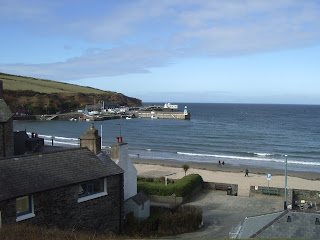.jpg)
I’m referring to the Second World War. There is a lot of it about, and a lot of post-war austerity in television dramas and on the pages of novels. Is this because we need to be reminded during times of recession that things can be so much worse? It also occurred to me that this particular period has a peculiar resonance for my own, post baby-boomer pre generation-x demographic, are people my age behind some of this interest?
The baby-boomer generation were often children during the war; if not their own parent’s lives were often defined by it. I have always thought that the selfish, hedonistic, escapist sixties were partially fuelled by an “I am bloody sick to death of hearing about the bloody war” mentality. Who can blame our parents? How on earth were they ever going to compete with the toughness, suffering and downright chutzpah of their parents. After all how do you rebel against a generation who repelled the Nazis? The only answer is to reject the world they fought for, even though it may have provided the only kind of culture in baby boomers could freak out and drop out.
It was different for my peers and I. Not only were the sixties our parents’ era, and therefore profoundly old fashioned but their generation were busy making terrible mistakes in the seventies and eighties. I never felt I had much to live up to in terms of my parents generation. But what really makes a difference is that perennial generation jump that engenders a fondness between grandparents and grandchildren. Our grandparents all came from that Wartime generation, some even recalled the Great War. We’d hear first about the exoticism of wartime
In the 70’s the remnants of the war were still also still around. The area next our tenement block (now part of the nine elms complex) was a bomb site. There were no ruins, but you’d still collect shiny bits of shrapnel and the odd bit of casing. There were other signs, the local little brick terraces had little low walls you walked along, but they weren’t walls, just the stone bases that had once supported railings. Old enamel street signs were peppered with singed holes and many terraces still had gaps or houses were shored up with huge wooden planks.
There are many retrophiles who revel in the romance, pugnaciousness and sheer style in the face of disaster that the home front represents. But I have always preferred the thirties. I suspect this is because I know that it is the hopes of the 30’s and the wish to preserve some elements of that glamourous but unstable world that drove my grandparents to persevere through bombs and barrages.
 I can understand the enthusiasm for wartime music and fashion. Laurence Llewellyn Jones of all people, in promoting the 40's as the style decade for some banal programme made the very pertinent point that things and people often looked great despite austerity, squalor and suffering. Admittedly most newsreels show grubby grim shabby people but lipstick still found itself being worn, hair was permed. For me part of the glamour was the role of women as firefighters, munitions workers, radio operators or the tough heart of the home front. It seems more appealing to look back at them when you consider the vapid, thin, sex-doll image that seems to epitomise the ideal of women now. The glamorous stereotype of the war had nails, resources and indomitability.
I can understand the enthusiasm for wartime music and fashion. Laurence Llewellyn Jones of all people, in promoting the 40's as the style decade for some banal programme made the very pertinent point that things and people often looked great despite austerity, squalor and suffering. Admittedly most newsreels show grubby grim shabby people but lipstick still found itself being worn, hair was permed. For me part of the glamour was the role of women as firefighters, munitions workers, radio operators or the tough heart of the home front. It seems more appealing to look back at them when you consider the vapid, thin, sex-doll image that seems to epitomise the ideal of women now. The glamorous stereotype of the war had nails, resources and indomitability.
But I still prefer the pre-war 30's stylistically and musically, I would have hated to have lived through the war, I lived through part of it, second hand through my grandparents and generally speaking it sounded horrific.

















